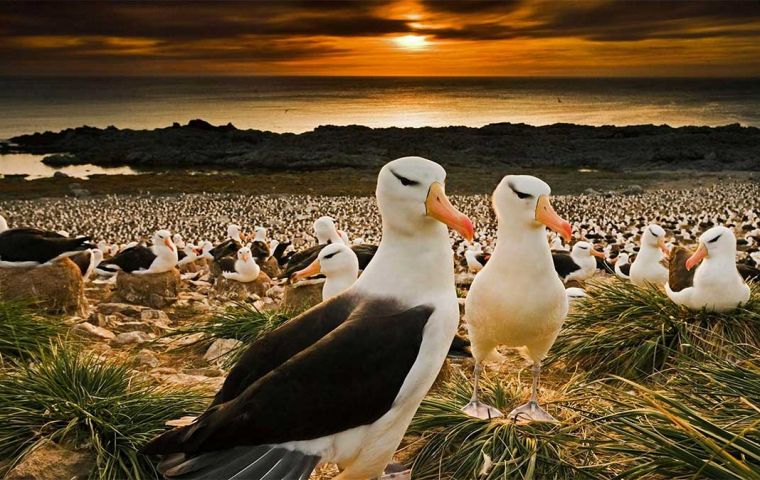MercoPress. South Atlantic News Agency
Safeguarding Oceans - theme for Albatross Day

By Veronica Iriarte - On Wednesday we celebraed our fifth World Albatross Day! The Agreement on the Conservation of Albatrosses and Petrels (ACAP) announced “Marine Protected Areas – Safeguarding our Oceans” as the theme for this year’s World Albatross Day.
The Falklands Islands are home for 72% of the black-browed albatross world’s breeding population and our waters are an important foraging area for several species, including the locally Endangered wandering albatross and the globally Endangered grey-headed albatross from South Georgia.
These two species are ACAP Priority Populations, as they comprise more than 10% of the world population and are currently declining more than 3% per year due to fisheries interactions elsewhere.
June 19 should be a day not only for admiring and respecting these amazing seabirds, but also to reflect on our own daily choices.
Although our black-browed albatross population is large and stable, of the 40 species of albatrosses and large petrels, 21 are listed by the International Union for Conservation of Nature (IUCN) as Vulnerable, Endangered or Critically Endangered, and 11 are Near Threatened.
Albatrosses and petrels spend a significant amount of time migrating and foraging in waters distant from their breeding grounds, which makes them vulnerable to interactions with fishing operations.
Since 2001 the Falkland Islands Government has been working towards seabird by catch mitigation in fishing operations. The first Falkland Islands National Plan of Action (NPOA) for reducing seabird incidental mortality in demersal longlining was published in 2004, and a National Plan of Action for reducing seabird incidental mortality in trawlers has also been produced.
These NPOAs represent a tool for fisheries management and facilitate effective seabird conservation measures.
Falkland Islands legislation for seabird protection include the Conservation of Wildlife and Nature Ordinance 1999 and the Fisheries (Conservation and Management) Ordinance 2005. In addition, as part of the U.K Overseas Territories, the Falkland Islands are also Party to ACAP, having the responsibility to take appropriate operational, management, and other measures to reduce or eliminate the incidental mortality of albatrosses and petrels in fishing operations.
The present year is a very special one because in 2024 we are also celebrating 20 years since ACAP came into force.
Over these two decades, the Agreement’s 13 Parties have continually strived to improve the conservation of listed albatrosses, petrels, and shearwaters.
Since 2001, Scientists from the Fisheries Department have been uniting efforts to monitor seabird interactions, develop and test bycatch mitigation measures, and monitor their implementation. As a result, seabird observed mortalities are currently negligible, however we still do have emerging challenges, like climate change and disease.
Nevertheless, opportunities are also on the rise, innovative tools and techniques are being developed, and their implementation in our fisheries – such as electronic monitoring- could further enhance seabird interactions monitoring and the assessment of seabird bycatch mitigation methods in place.
On Albatross Day, please save a few minutes to go to the waterfront, walk on the beach, look at the horizon, and gift yourself the magical sight of a flying albatross or petrel…pure beauty and inspiration!




Top Comments
Disclaimer & comment rulesCommenting for this story is now closed.
If you have a Facebook account, become a fan and comment on our Facebook Page!